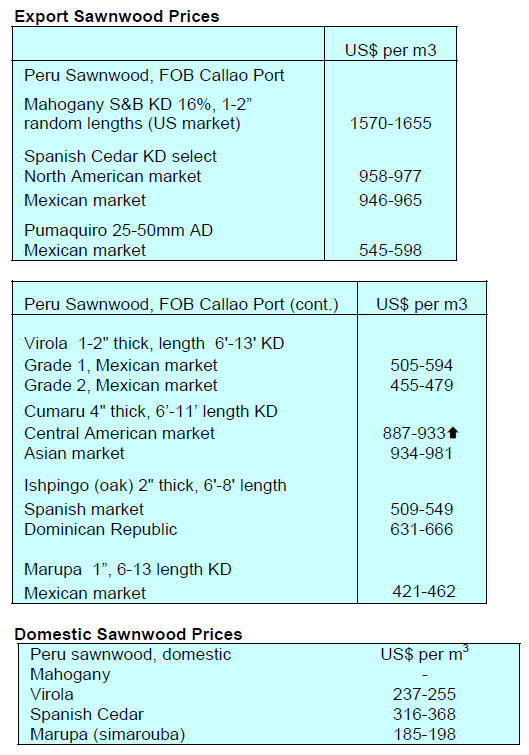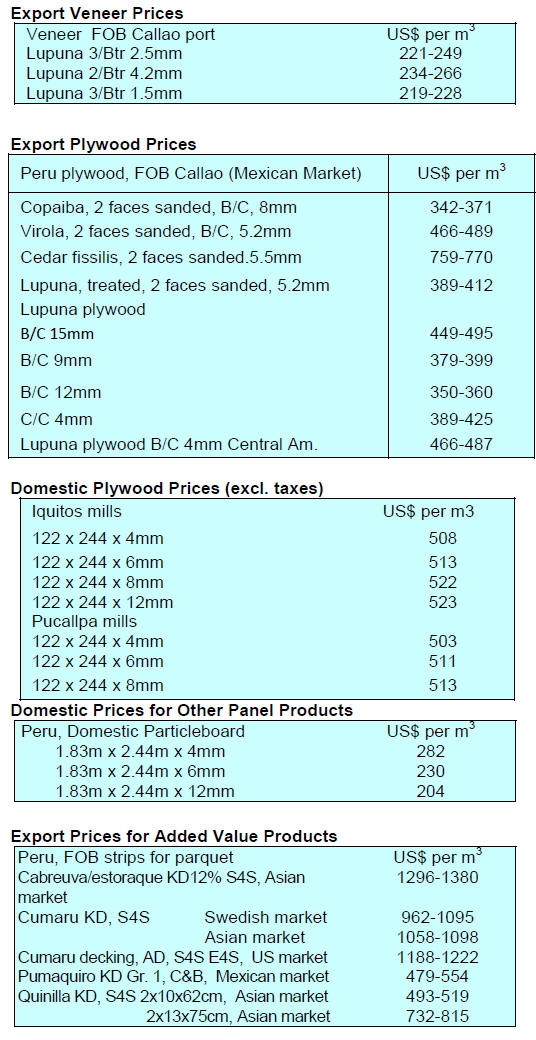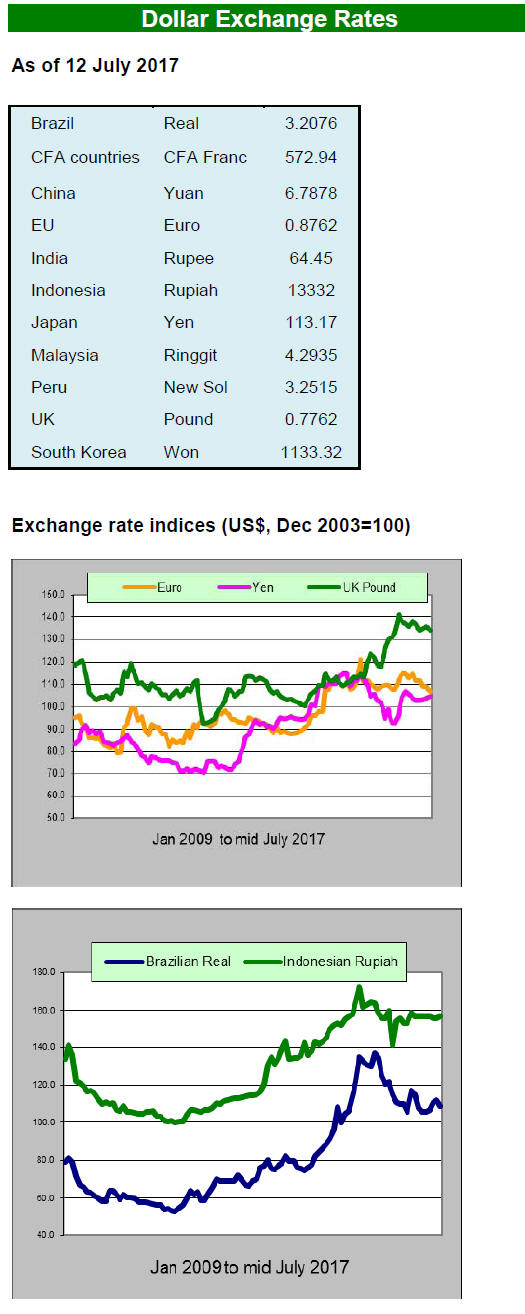2. GHANA
Expanding value added wood processing
The World Trade Organization recently organised a
workshop in Accra to discuss how best to add value to raw
materials before their export. This workshop attracted
participants for both the public and private sectors.
This WTO initiative forms part of its focus on "Challenges
in the multilateral trading system: perspective from West
Africa". The programme aims to help countries that seek
speedier industrialisation and need assistance on global
investments and trade.
The new government in Ghana is committed to greater
industrialisation and added value manufacturing to reduce
its reliance on commodity markets.
In Ghana, processed wood products accounts for a
major
share of all timber exports but sawnwood is classified as
‘processed’ but has little added value. The intention of the
government is to see companies invest in more
downstream processing.
A reduction in import duties debated
The Ghana government has hinted of plans to drastically
reduce import duties in an effort to minimise duty
avoidance which the authorities suspect is significant.
According to a government spokesperson, the reduction in
duties would also enable the ports to become more
efficient in clearing cargos.
Anthony Dzadzra, Director of Revenue, Policy Division at
the Ministry of Finance, mentioned this idea during an
informal meeting of the American Chamber of Commerce,
USAID and the Ministry of Trade which focused on a new
study of the impact of trade-related fees and charges on
trade and revenue growth.
U.S Ambassador Robert P. Jackson encouraged Ghana to
take advantage of the Trade Facilitation Agreement (TFA)
to simplify customs and other border control procedures at
the country’s ports. He added, this will reduce the cost and
time of doing business across borders, increase economic
growth and make Ghanaian goods more competitive in
global markets.
The WTO Trade Facilitation Agreement was conceived as
traders from both developing and developed countries
have long pointed to the vast amount of “red tape” that
still exists in moving goods across borders and which pose
a particular burden on small and medium-sized
enterprises. To address this, WTO Members concluded
negotiations on a landmark Trade Facilitation Agreement
(TFA) in 2013.
For more see: http://www.tfafacility.org/trade-facilitationagreement-
facility
The Organization for Economic Cooperation and
Development estimates that implementing the TFA could
reduce worldwide trade costs significantly with the
greatest benefits accruing to African and other developing
countries. Ghana has the potential to benefit significantly
from this new opportunity.
The reduction of import duty was part of the campaign
promises made by the new government during campaign
elections last year. Early this year Ghana sought the
approval of ECOWAS Regional Common External Tariffs
(CET) which came into effect on 1February 2016, to
review taxes downward to promote industrialization.

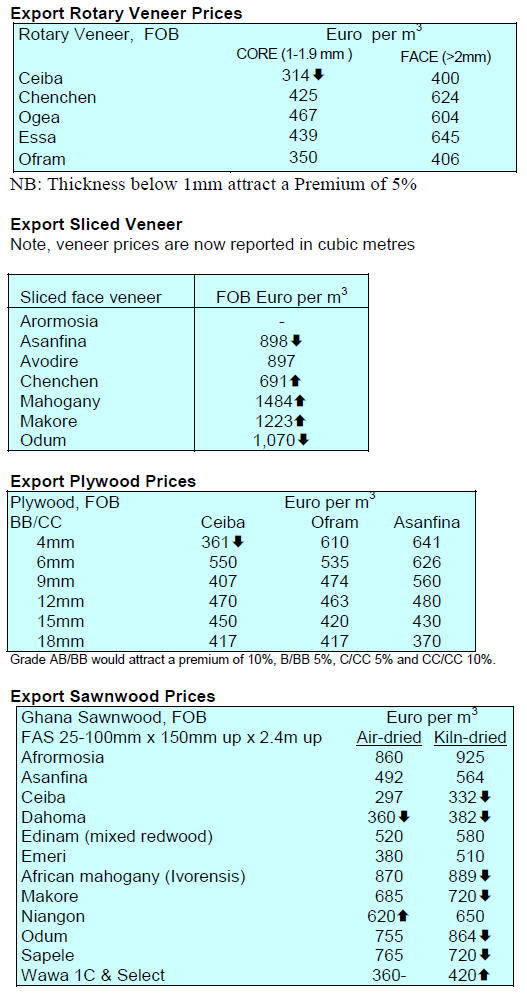
3.
SOUTH AFRICA
Efforts to coordinate recovery efforts in
Cape area
Forestry and sawmilling executives in the fire-ravaged
Southern and Eastern Cape areas, representatives of
Forestry South Africa (FSA) and Sawmilling South Africa
(SSA) have met to coordinate collaboration as efforts on
recovery begin. One of the first tasks is to assist affected
industries and develop plans to mitigate losses through
salvaging as much timber and wood products as possible.
The recent fires cause widespread devastation. There has
been extensive damage to plantations and one complete
sawmill was burnt to the ground. The scale of the disaster
is the one worst that the industry has experienced.
In terms of employment, there may be a short-term
increase in job opportunities during the salvage operations
and reforestation operations. However, in the medium to
longer term and until the plantation rotations get back to
normal some jobs may be lost.
The FSA, SSA as well as the South African Forestry
Contractors Association plan to ensure that the interests of
local businesses and jobs are protected. The South African
Wood Preservers Association (SAWPA) will carry out
research around the ‘treatability’ of burned poles.
http://saforestryonline.co.za/news/industry-rallies-recovercape-
fire-storm/
Outlook grim for consumers
Consumer confidence in South Africa slipped further
extending one of the longest periods of negative sentiment.
The Bureau for Economic Research at Stellenbosch
University conducts quarterly assessments on consumer
sentiment and has said the current run of negative
sentiment is the longest since the survey was launched in
1982.
In related news, the International Monetary Fund has
warned the South African economy will become
increasingly at risk to major shocks unless economic
growth is revived. The IMF says South Africa’s economic
growth is projected to increase to 1% this year and just
1.2% in 2018.
Jason Muscant, Senior Analyst at the First National Bank
Bureau for Economic Research, said the latest data show
that consumers continue to be under pressure especially as
food prices remain high which signals a drop in disposable
income.
4.
MALAYSIA
Ban on sawn rubberwood export
Malaysia has once again introduced a ban on the export of
sawn rubberwood. The current ban came into effect 1 July.
Over the past 20 years the government has periodically
imposed and lifted bans on sawn rubberwood exports. The
latest ban comes after Peninsular Malaysia furniture
makers found it increasingly difficult to secure sawnwood
for downstream processing. The ban comes as a relief to
the furniture makers as the cost of sawn rubberwood has
been rising steadily.
Last year, Malaysia’s furniture exports totalled to RM9.53
billion, 4.2 per cent more than 2015’s RM9.14 billion,
making the country, the world’s 9th largest furniture
exporter.
Rubberwood furniture makers had a strong case when
lobbying for the ban saying Malaysia had slpiped from 6th
to 9th in the global ranking of furniture exporters.
The argument used by exporters of sawn rubberwood
hinged on their success in attracting high prices from
buyers in Vietnam and China. In 2016 Malaysian
sawmillers exported sawn rubberwood valued at around
RM300 million.
Speaking recently Minister Dr Wee Ka Siong added
the
ban will provide relief for the industry as recently the cost
of the raw material had shot up to RM2,300 per tonne
compared with RM1,600 previously. With the ban on
export of local rubberwood put in place, furniture industry
players are now working hard to win back the confidence
of their overseas clients.
Drones rapid response to locate forest fires
Drones have been proven effective in trials in Miri and
Kuala Baram districts of Sarawak to quickly assess the
location and extent of forest fires. Rapid response arial
surveillance using drones will be effective in locating the
exact locations of any forest fires.
Last year, more than 1,700ha of land in the two districts
were ravaged by fires and there is a danger of more fires
this year. In past experience, all it takes is five days
without rain and a forest fire could be sparked easily.
Hidden wealth in Sarawak
The Sarawak State government will establish a research
council to coordinate efforts to explore the ‘hidden wealth
in the state’s natural resources’. According to Chief
Minister, Abang Johari Tun Openg, there is hidden wealth
in the Sarawak forest resources that can be exploited.
The research council would be empowered with regulatory
powers over research with the ultimate aim of benefitting
the state’s economy.
Plywood export prices
Plywood traders in Sarawak reported export prices:
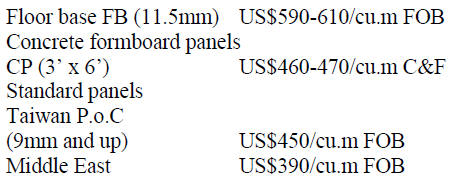
5. INDONESIA
20,000 plus FLEGT licenses
Since the launch of the FLEGT Indonesia license scheme
on November 15, 2016 Indonesia has issued 20,778
licenses for the export of wood products to the EU. These
licenses were for products worth US$730 million and had
a shipping weight of 343,000 tonnes.
At a recent meeting, Michael Bucki of the European
Commission Delegation in Jakarta, reminded that the EU
timber regulation has three principles:
 it prohibits placing in EU markets
timber
it prohibits placing in EU markets
timber
products which have not been verified legal
 it requires EU merchants importing wood
it requires EU merchants importing wood
products for the EU market to conduct 'due
diligence' procedures;
 it requires EU
operators to archive all data of
it requires EU
operators to archive all data of
their suppliers and buyers
Dr. Rufiie of the Ministry of Environment and Forestry
noted that FLEGT licensed wood products shipped to the
EU have a competitive advantage but that there are other
factors that contribute to determining the competitiveness
of a product, such as design, quality and price. This is why
Indonesian manufacturers must continue to assess
competitors in Vietnam and Malaysia for example as they
will be vying for a larger share of the EU market.
Challenge to dominance of China in the US market
The potential of Indonesian wood-based product exports to
the United States is huge and much more can be done to
increase exports to this market according to Arifin
Lambaga, President of PT Mutuagung Lestari.
According to Arifin, the US market for imported wood
products is around US$2 billion annually of which
shippers in China account for about half with Indonesia
only capturing around 10% of this huge market.
With the introduction of tighter formaldehyde emission
regulations, Arifin said Indonesian exporters have an
opportunity to increase exports to the US and take market
share from China.
The US government, through the Environmental
Protection Agency (US-EPA), has issued updated
regulations on the emission of formaldehyde from
composite wood products which include hardwood
plywood veneer core, hardwood plywood composite core,
particleboard and MDF.
Craftsmen to get help meeting cost of SVLK
certification
Sudarto, the Director of the Food, Wooden Goods and
Furniture Directorate in the Ministry of Industry has said
government policies on the SVLK need to be simplified so
as not to be a burden for manufacturers, especially the
SMEs. It is understood that the Ministry of Industry,
Ministry of Environment and Forestry, Ministry of Trade
and the Ministry of Finance plan to review this issue.
Sudarto said a contribution to cover the cost of SVLK
certification will be provided directly to SMEs which have
export potential but are unable, in the short-term, to meet
the cost of certification.
It has been estimated that a furniture maker needs find
around Rp 40 million to cover the cost of certification but
this is a very heavy burden for small companies and is out
of proportion to the value of exports they could hope to
achieve.
Austrian private sector keen to support Indonesia
KADIN Austria, the Austrian Chamber of Commerce and
Industry, supports timber Industry and Infrastructure
development. A spokesperson from KADIN Austria has
said the Chamber was ready to support Indonesia's
development process especially in infrastructure
development, power plants, the timber industry and
vocational training.
In addition, KADIN Austria will promote Indonesia’s
FLEGT licensed wood products. The Permanent
Representative of Indonesia in Austria, Darmansjah
Djumala, has reported that Austrian consumers appreciate
the wide range of wood products from Indonesia,
especially outdoor furniture.
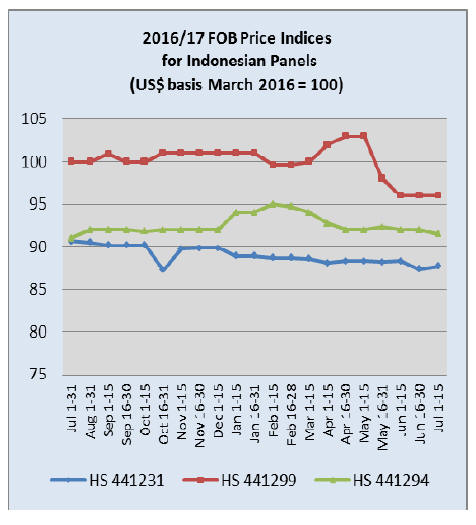
6. MYANMAR
Private sector SMEs to get help from new
DFID
programme
A UK-funded programme called the ‘DaNa Facility’ has
just been launched. DaNa is Burmese for “prosperity”.
The aim of this programme is to reduce poverty and
increase incomes by fostering a strong business
environment conducive to the creation of jobs and
economic opportunities especially for SMEs.
At a press briefing arranged by the British Chamber of
Commerce Myanmar, Peter Brimble, the DaNa team
leader, said grant window is to be launched in August to
attract companies with projects to strengthen value chains
and promote inclusive economic growth with an emphasis
on businesses in agribusiness, community forestry,
garments and textiles.
The DFID website says this initiative was first launched in
May 2016 as one of three components of DFID’s
“Business for Shared Prosperity” (BSP) programme. DFID
is supporting activities of the Myanmar government’s
objectives and policies on economic development, which
includes the Livelihoods and Food Security Trust Fund
and trade and investment activities through the World
Bank Group.
Brimble said the main issues for Myanmar’s include
inadequate infrastructure and energy, limited financial
services (especially for SMEs). He also mentioned that
Myanmar government’s approach at present is mainly
regulatory with few programmes for new entrepreneurs
which DaNa hopes to address.
For more see: https://www.dai.com/our-work/projects/burmadana-
facility
Trade deficit balloons
Myanmar’s trade deficit in the first three months of this
fiscal year totaled just over US$1 billion as imports
exceeded exports
Data from the Ministry of Commerce shows that the trade
value was over US$7.128 billion compared to the
US$1.262 billion for the same period last year. For the
first three months of this fiscal year Myanmar ‘s exports
totaled US$2.855 billion while imports were US$4.273
billion. The impact of the log export ban on export
earnings is significant.
Priority areas for investment announced
The Myanmar Investment Commission (MIC) has
announced priority areas for investment by both domestic
and foreign entrepreneurs. These include: agriculture,
livestock and fishery, export promotion, import
substitution, power, logistics, education, health care,
affordable housing construction and establishment of
industrial estates.
Analysts write that the timber industry trade and industry
is not included although it contributed significantly to job
creation and export earnings in the past.
Despite not being included in the investment promotion
campaign the timber sector (through the Myanmar Timber
enterprise) is expected to contribute 37 billion Kyat to the
2017-18 budget revenues. MTE is one of the five
commercial state institutions that are set to contribute to
state income:
Minister - illegal felling and smuggling continues
Corruption in the forestry sector and the extent of illegal
trade in timber has captured the attention of the Parliament
with the submission of a proposal by a member of
parliament to strengthen the action to combat the illegal
logging. Analysts write that this is aimed at corrupt
authorities and weak law enforcement.
The parliament is also debating the new Forest Law to
replace the old law of 1992. Some civil groups are
requesting greater consultation before the law is submitted
to the parliament but this has drawn comments from
parliamentarians that they represent all constituents in
Myanmar.
U Ohn Win, Minister of Natural Resources and
Environmental Conservation has reported that K53.10
billion was earned from auctions of 50,245 tonnes of
seized illegal teak and hardwood during fiscal 2016-17.
However, the Minister has said illegal felling and
smuggling across the border continues and suggested that
local officials must be involved.
A system has been introduced to reward those reporting
illegal logging with reports saying informants will get
20% of the auction price of the seized timber and if the
information leads to the arrest of illegal loggers then a
30% payout will be made.
But informing on criminals is very dangerous. Between
2002 and 2003 eight people in Myanmar have died,
including a Forestry Department Deputy Director, 42
others have been injured confronting illegal loggers and
smugglers.
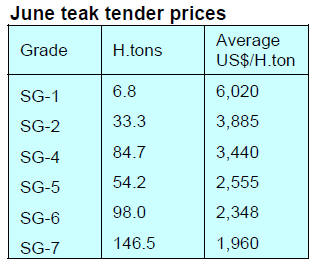
7. INDIA
Business leaders ask for more time to
implement GST
On 1 July India replaced its numerous federal and state
taxes with a single Goods and Services Tax (GST). This
replaces more than a dozen central and state levies
including factory-gate, excise duty, service tax and local
sales tax and is India’s most daring tax reform in 70 years.
Analysts say the single GST will cut red tape and increase
tax revenues. The Finance Minister said the change will
stimulate growth but business leaders have asked for more
time to implement changes. Many SMEs do not have
access to the internet to register on the GST network.
Under the GST goods and services will be taxed under
four basic rates - 5%, 12% 18% and 28%. Some food
items are exempted from GST but will still be subject to
existing taxes.
The GST rates for timber and plywood have been set at
18% and 28% respectively. The private sector feels both
rates are too high and have appealed for their review.
If a review is undertaken the private sector says it should
reflect a reduction over the old VAT. The rate of VAT
was not uniform throughout India varying from State to
State.
The change to GST could impact prices for imported
timber and logs. Analysts write that it appears Customs
Officers will assess import duty on the basis of baseline
prices provided by their head office.
The changes in tax rates and duties will eventually
filter
down to changes in C&F and wholesale prices.
Auctions in Western Indian
Auctions have been concluded at various Forest
Department Depots in the North and South Dangs and
Valsad Divisions. Approximately 8,000 cubic metres
mostly teak logs were put up for sale the balance were
hardwoods such as Adina cordifolia, Gmelina arborea,
Pterocarpus marsupium, Acacia catechu and Mitragyna
parviflora.
Since imported plantation teak logs are mostly of small
girth buyers of domestically sourced logs are keen to
secure larger girth as recovery rates are higher and the
wood quality is superior.
The flow of freshly felled teak logs has been good and this
will prompt the authorities to mount another auction in the
near future. Prices secured at the latest auction are shown
below:
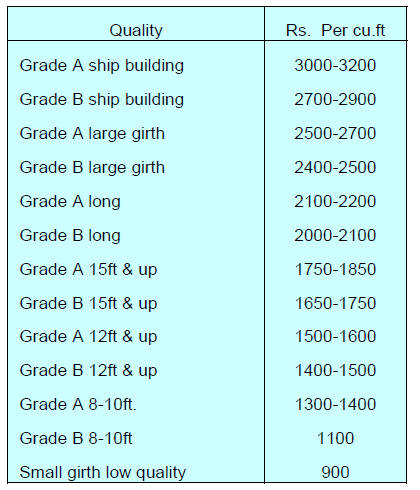
Good quality non-teak hardwood logs also attracted
firmer
prices than at the previous sale.
Top quality non-teak hardwood logs 3-4m long having
girths 91cms & up of haldu (Adina cordifolia), laurel
(Terminalia tomentosa), kalam (Mitragyna parviflora) and
Pterocarpus marsupium attracted prices in the range of
Rs.800-1000per cu.ft. Medium quality hardwood logs
were sold at between Rs500-700 and low grade logs sold
for Rs.300-400 per cu.ft.
Marayur sandalwood - Rs11 million per tonne
The mood amongst buyers was very upbeat for the recent
sandalwood auction say analysts. This was the first auction
after the GST came into effect and was held 12 and 13
July. Some 70 tonnes of sandalwood in more than 200 lots
was offered.
With the introduction of the standard GST the tax rate rose
to 18% from 14.5% (previously the value added tax).
Analysts write that buyers response at the past auction was
very subdued as a result of uncertainty surrounding the socalled
‘demonetisation’ of high value currency notes last
year.
Over the past weeks representatives of major buyers and
temples visited the sandalwood sales divisions to register
their participation in the auction. At the latest auction there
was greater interest on the part of buyers representing
temples. While not major buyers, analysts interpret the
increased presence of religious organisation buyers as
indicative of the falling availability of sandalwood from
other, sometimes illegal, sources.
At this auction 33.5 kg of first quality sandalwood
(Vilayat Buddha) was offered, the first time in five years.
In addition, 69 kg of sandalwood root, 11.7 tonnes of Jai
Pokal (10th class) and 14.8 tonnes of mixed chips (13th
class) were included in the auction.
Though sandalwood auctions are also being conducted at
Shimoga and Mysuru in the state of Karnataka, Marayur
sandalwood is considered top in quality for high oil
content thus prices are high.
It has been reported that the average price of Marayur
sandalwood is Rs.11 million per tonne whereas it is
around Rs.57 million in Shimoga and Mysuru.
Sandalwood from Mysuru is considered second quality
compared to sandalwood from Marayur.
Imported plantation teak
Demand for imported plantation teak logs remains stable
and Indian buyers are benefitting from a stronger rupee.
Prices have not changed over the past two weeks but could
be affected by the 18% GST. As price changes evolve
these will be reported. Prices prior to the introduction of
GST are shown below.
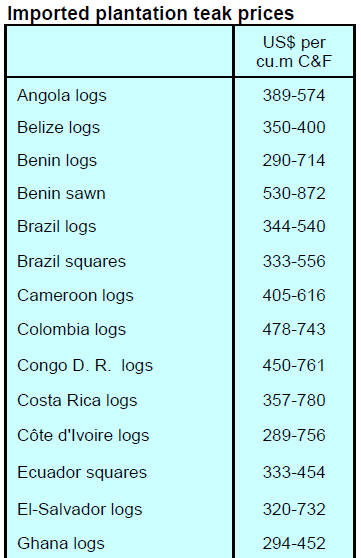
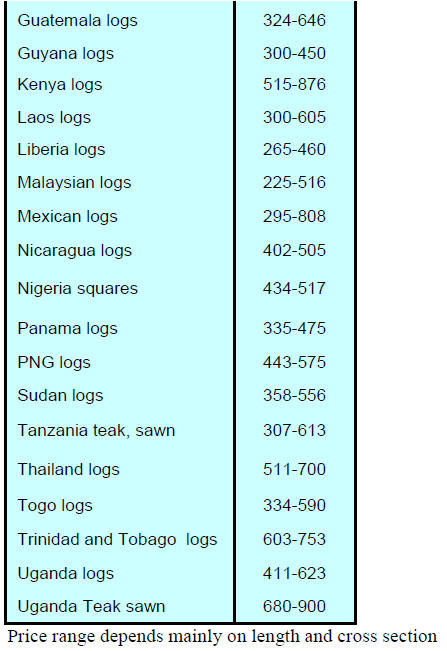
Locally sawn hardwood prices
Prices for hardwoods milled from imported logs are
unchanged but sales are subject to a GST of 18%. This
will inevitably lead to new price structures in the coming
months.
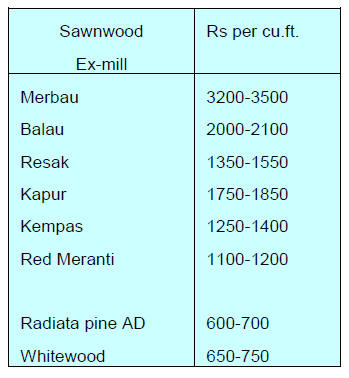
Myanmar teak prices
There were no reports of price movements over the past
two weeks.
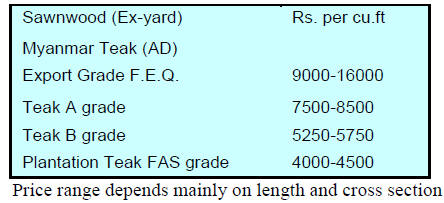
Prices for imported sawnwood
Prices for imported sawnwood (KD 12%) remain
unchanged.
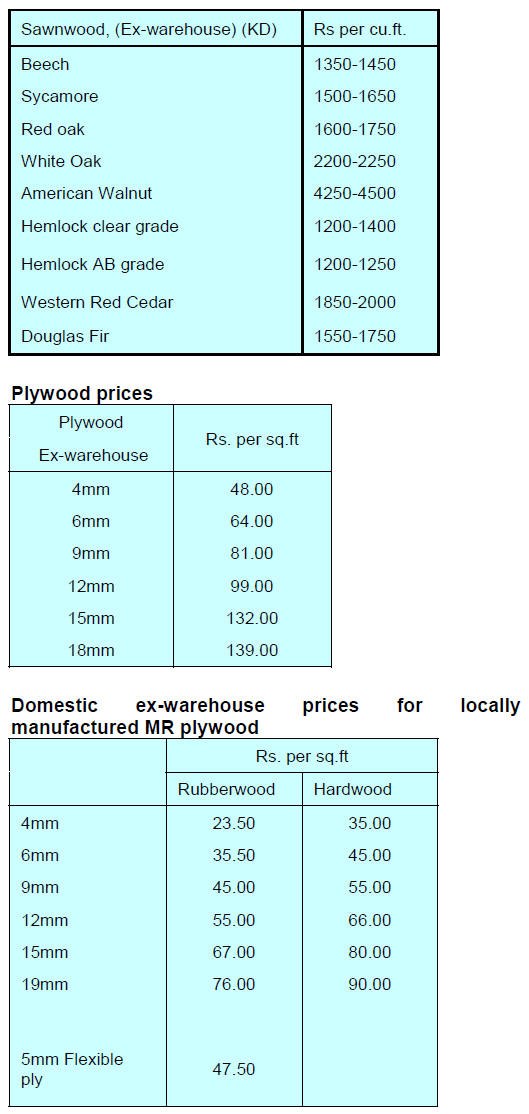
40 million saplings planted – target exceeded
The Forest Department in Maharashtra State has said it
exceeded its target of planting 40 million saplings across
the state. As of 11 July 45.4 million saplings – 32.3
million in forest areas and 13.1 million in non-forest areas
– had been planted by 13,14,554 participants. Most
saplings were planted at Chandrapur, Ahmednagar,
Nashik, Palghar, Pune and Yavatmal.
This effort was part of the Van Mahotsav (Tree Planting
Festival), an annual tree plantation festival held from 1-7
July across India.
This festival takes place in all the States of Union
of India
and the present government policy is pressing for
increasing the present forest cover of 21% to 33%.
For more see: http://www.festivalsofindia.in/Van-
Mahotsav/Index.aspx
8. BRAZIL
Reducing illegal deforestation
The Mato Grosso State Government has established a
committee to monitor compliance with the goals set forth
at UNFCCC COP21 in Paris. Mato Grosso has committed
to reduce illegal deforestation to zero by 2020 and also to
take action to contribute to efforts to address global
warming.
A project submitted by the Center for Timber Producers
and Exporters of Mato Grosso (CIPEM) was selected for
support. The CIPEM initiative aims to adapt wood frame
technology to native timber species for civil construction.
The aim is to strengthen the industry, generate economic
and social development and contribute directly to the goal
of expanding the area under sustainable forest
management in Mato Grosso state from 2.8 to 6 million
hectares by 2030.
Building systems designed around wood have numerous
environmental benefits because wood is a fully renewable
material that captures and traps greenhouse gases.
Systemised building systems of the type being proposed
reduce building costs and minimise the amount of residues
during the construction.
This CIPEM project will attempt to utilise species that
currently have little or no commercial value and will also
see more forests protected and greater efforts made on
combating illegal deforestation.
No duty on imports of sawnwood
On 30 June the United States government announced
details of its annual review of the General System of
Preferences which included the renewal of duty free
imports of HTS 4409.10.05 (Coniferous wood
continuously shaped along any of its ends, whether or not
also continuously shape along any of its edges or faces).
This was seen as a victory by the Brazilian Association of
Mechanically-Processed Timber Industry (ABIMCI)
which had been lobbying hard for the renewal.
This means Brazilian exports of this product to the US
market will continue without import tax which could have
become 3.2% if the renewal was not approved.
This decision guarantees the continuity of the duty-free
treatment for the product for 5 years. If, after 5 years, US
imports from Brazil exceed 150% of the competitiveness
limit in US dollar or 75% of the total volume imported by
the US, this benefit will be automatically revoked.
ABIMCI had considerable support in its efforts to secure
this decision by the US. The Ministry of Foreign
Relations, the Ministry of Development, Industry and
Foreign Trade, the Presidency of the Republic and Apex-
Brazil, the Federation of Industries of the State of Paraná
(FIEP), the Brazil and the United States Business Council
(CEBEU) and National Confederation of Industry (CNI)
all contributed to this success.
Investment opportunities in the US timber sector
ABIMCI, in collaboration with the Federation of
Industries of Paraná (FIEP), participated in the Select USA
Summit sponsored by the US government in June.
The event, led by the US Department of Commerce,
focused on promoting business development with US
companies. The meeting addressed trade opportunities and
market potential and highlighting issues such as the
favorable environment for conducting business, legal
security and investments practiced in the country.
Parallel to the federal government's participation, various
U.S. states promoted their inward investment programmes
and representatives of several American companies
explained how the current US administration approaches
inward investment.
Representatives of ABIMCI participated in specific
meetings with US trade representatives and with the
Director General of the ‘Select USA programme’ which
aims to encourage business opportunities in the timber
industry.
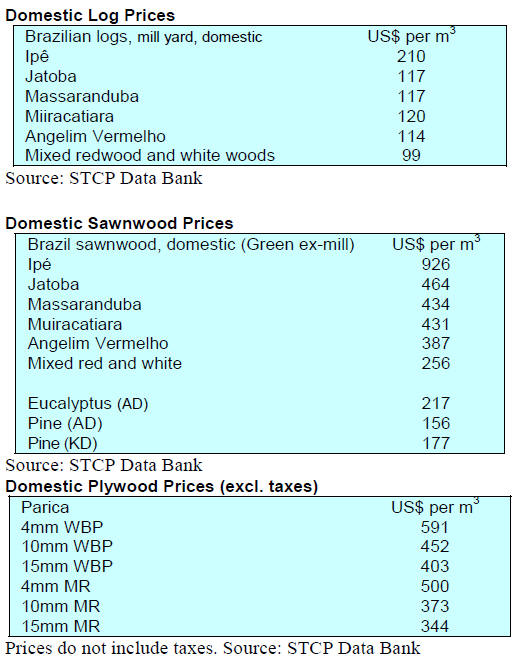
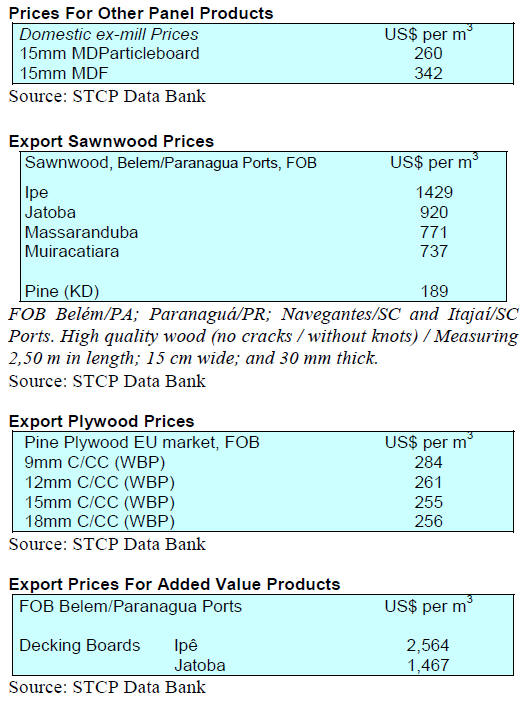
9.
PERU
Strengthening inter-institutional
cooperation
The National Forest Conservation Programme for the
Mitigation of Climate Change in the Ministry of
Environment and the Forest and Wildlife Resources
Monitoring Agency (Osinfor) have signed an addendum to
strengthen Inter-institutional cooperation. The objective is
to promote good practices in the management and legal
and sustainable use of forests to contribute to their
conservation. The programme covers native and forest
communities as well as forest concessionaires.
Potential and opportunities in forest plantations
Where does Peru want to be in the next 25 years in terms
of forest plantations? This question served as the guide to
a discussion at a workshop that resulted in the publication
"Forest plantations in Peru: reflections, current status and
future perspectives".
The workshop was organised by the Peruvian office of the
Center for International Forestry Research (CIFOR), the
German GIZ (through its ProAmbiente II programme) and
the Peruvian Society of Environmental Law (SPDA).
The publication provides an overview of the current state
of the forest plantation sector in Peru and offers a common
vision for the medium and long term.
Manuel Guariguata, CIFOR Regional Coordinator for
Latin America, said “It is the synthesis of the visions and
opinions of many specialists, present ideas, options and
reflections on what has worked and what has not.
It aims to revitalise the issue of forest plantations as a
potentially important alternative for the economic and
forestry development of the country, in an
environmentally and socially sustainable way”.
The publication touches on technical, institutional,
capacity building, financing and incentive aspects related
to the forest plantations sector.
Workshops begin to elaborate National Forestry and
Wildlife Plan
The Ministry of Agriculture and Irrigation (Minagri),
through the National Forest and Wildlife Service (Serfor),
has initiated the first round of departmental workshops
involving stakeholders in the management of forest and
non-timber resources, wildlife, ecosystem services as well
as research and technology in the process of building the
National Forestry and Wildlife Plan.
These workshops will allow Serfor to define the strategic
themes of the forestry and wildlife sector as well as locate
and contact stakeholders related to the sector to compile
their contribution and ensure their participation in the
process. The second round of nine macroregional
workshops will be held in August.
Serfor wishes to incorporate three key elements: fostering
and ensuring wide participation; demonstration of
institutional commitment and the vision for modern and
productive growth of the sector.
